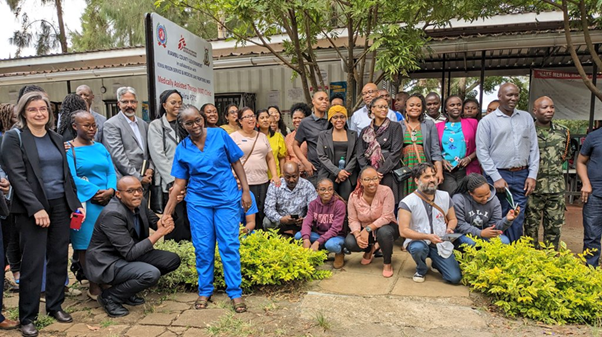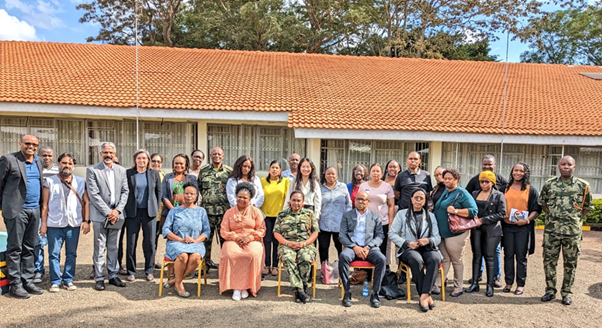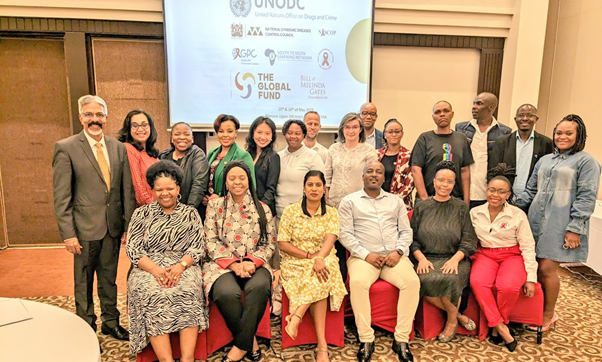Establishing and delivering evidence-based, high-quality opioid agonist therapy services South Africa delegation to Kenya

From 15th until 19th of May 2023, UNODC organized, in collaboration with GlobalFund, SANAC and South to South Learning Network, a Harm Reduction Learning Visit to Kenya for delegations from WHO as well as various stakeholders from Central Drug Authority, National Department of Health, South African National AIDS Council, Department of Correctional Services, Civil Society, NACOSA - Networking HIV & AIDS Community of Southern Africa, South African Police Service and Representatives of People Who Inject Drugs.
This 5-day learning visit started with a 2-day Opioid Agonist Treatment training conducted by Dr Andrew Scheibe - UNODC Consultant, Dr Monica Ciupagea - the HIV/AIDS Expert, UNODC Vienna and Mr Gunasekaran Rengaswamy - the Regional Programme Officer for Southern Africa and HIV/AIDS Prevention and Care.
The purpose of the visit to Kenya was to learn about the principles and procedures of establishing a medically assisted programme, a needle and syringe programme, and the importance of community engagement.
The specific objectives of the visit were to:
- Understand how the national key populations programme is coordinated that facilitate the improvement of programs and policies.
- Learn from the experiences of good practices in the implementation of the key population’s programmes and harm reduction interventions in Kenya and South Africa.
- Identify and understand the Role of Stakeholders in a harm reduction programmes.
- Understand and replicate the day-to-day implementation requirements of harm reduction programmes.
- As part of this training, site visits were conducted to PWID programmes such as Nairobi Outreach Services Trust (NOSET) and Support for Addictions Prevention Treatment in Africa (SAPTA), as well as to clinics of Mathare Medically Assisted Therapy (MAT), Ngara Medically Assisted Therapy (MAT) and Ruiru Prison Medically Assisted Therapy (MAT).

Meeting with the Department of Corrections, Kenya
Major outcomes of the visit were:
- The delegation received practical exposure to the different sites that offer Medically Assisted treatment (MAT) and PWID programs. This had provided the visiting delegation the opportunity to clarify their doubts and learn about how it can be adapted and implemented.
- The visiting delegation appreciated the efforts by the Kenyan Department of Prisons allowing the PWID community to access harm reduction services inside their premises. The integrated services offered by the MAT clinics in-prison campus was appreciated by the delegation.
- Following the UN’s core values of respect for human rights, the training team was equal, friendly, and regardful in inquiry about the impact of treatment and lifestyle changes of PWID and expressed satisfaction with the results achieved.
- The role of civil society and their involvement was appreciated and is a critical factor to the success of the harm reduction interventions implemented on the ground. NGOs are considered as partners in the Kenya programme.
- Role of UNODC was appreciated by the delegation in initiating and providing technical support to these interventions on the ground.
- Sensitization of police and judiciary in creating an enabling environment for providing harm reduction services was appreciated by one and all.
- Other significant observations were - great relationship with Donors and Implementing partners including UNODC, very strong in research to produce data for decision making, MAT clinics are well established and equipped with regards to human resources capacity and the well-defined roles and responsibilities of each part of the program is clearly defined and respected.
- The delegation also feels that this learning visit help a lot in scaling up out harm reduction and OAT services in prisons and in the community in South Africa.

Participants of the UNODC organised – OAT training.